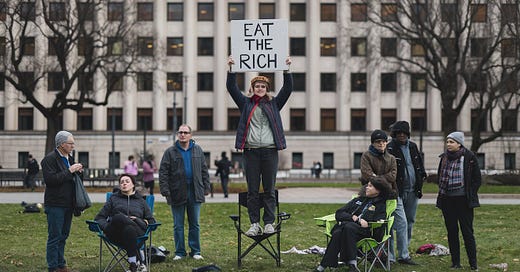Liberalism has reached a breaking point. The ideology that once balanced individual rights with a semblance of social responsibility has been hollowed out by its own contradictions. While many still cling to the virtues of freedom, plurality, and tolerance, the economic framework that underpins liberal democracy—possessive individualism—has facilitated obscene wealth accumulation and disparity. As a result, liberalism no longer holds ideological validity for vast portions of the population. Its economic promises have been abandoned, while its cultural values are contested on all sides.
Possessive Individualism and the Crisis of Liberalism
The political theorist C.B. Macpherson identified a core flaw in liberal democracy: its foundation in possessive individualism. In his seminal work The Political Theory of Possessive Individualism, Macpherson argued that liberalism assumes individuals are fundamentally self-owning, self-interested property holders, with society functioning primarily as a marketplace where transactions take precedence over collective obligations.
This ideology underpins the extreme wealth concentration we see today. The logic of possessive individualism dictates that economic success is a reflection of one’s inherent worth, while poverty is a personal failure rather than a systemic issue. It enables billionaires to hoard resources while justifying the erosion of public services and collective institutions. As long as liberalism operates on these principles, it will continue to serve only the interests of the ultra-wealthy, while the majority struggles within an increasingly precarious system.
The Hard Right as the Anti-Establishment Establishment
The first and most visible response to this crisis has been the rise of the hard right. Paradoxically, this movement has positioned itself as the voice of anti-establishment sentiment, despite being directly backed and enabled by the very oligarchy that benefits from liberalism’s failures. The billionaire class—who have spent decades hollowing out social democracy, suppressing wages, and privatizing public goods—now bankrolls the far right, not just in the United States but across the globe.
Trump’s return to power, or any similar far-right regime, represents the consolidation of this trend. He is both the figurehead of resentment against the ruling class and its most willing agent. The movement that claims to reject global elites is, in reality, their weaponized project: a distraction that directs popular anger downward—towards immigrants, marginalized communities, and the bureaucratic state—rather than upward, at the forces of capital that orchestrate this crisis.
But the contradiction remains: the Trump regime, like all authoritarian capitalist movements, will radically intensify wealth concentration and disparity. Through tax cuts for the ultra-wealthy, the erosion of labor protections, and the dismantling of public institutions, wealth will flow ever upward. What makes this moment particularly dangerous is the potential to militarize and automate economic disparity—using AI, surveillance, and security technologies to preemptively suppress dissent and consolidate power in ways previous right-wing movements could not.
The Alternative: An Economy of Care
While the far right has capitalized on anti-establishment sentiment, it is only a temporary beneficiary of the ideological collapse at the center. The economic contradictions of possessive individualism—that wealth and resources belong only to those who can seize and defend them—will remain unresolved. This opens fertile ground for a radical left-wing alternative that rejects both neoliberalism and right-wing authoritarianism.
Such an alternative must be built on wealth redistribution and economic democracy. But beyond mere redistribution, the left must offer a fundamentally different vision of economic life—one that prioritizes an economy of care over an economy of capital extraction. This means:
Reframing wealth in terms of collective well-being rather than individual accumulation.
Reclaiming public goods—education, media, healthcare, housing—as non-negotiable human rights.
Addressing climate change through cooperative, labor-intensive solutions rather than market-driven ones.
Resisting automation-for-profit and instead leveraging technology for shared prosperity.
The Right’s Insecurity and the Left’s Strength
The right wing's dominance in the current moment is not due to its strength, but to the absence of a viable left alternative that captures the public imagination. However, the far right is also deeply insecure about this possibility. This is why its media machine invests enormous energy into dehumanizing the left and distorting its ideas.
The attacks on socialism, communism, and any form of leftist thought are not just ideological—they are acts of desperation. The right understands that if the left is able to articulate a clear and compelling vision of economic justice, the facade of reactionary populism will crumble. The extreme lengths to which right-wing movements go to demonize their opponents—framing them as existential threats rather than political adversaries—reveals their fear. They recognize that the left holds the potential for a realignment of power, one that challenges not just the political class but the economic system itself.
The future of authority is being contested now. The question is: who will define what comes next?
In our sixth episode of the Red-Tory podcast, Avi does a damn fine job of addressing that question:





Thanks so much for these. It is great to be reading something that isn't doom-and-gloom about the failings of the current social infrastructure. A recognition that “Capitalism”, “Possessive Individualism” and “Liberalism” weren't ideal is in my mind critical.
Whenever I hear conversations about "redistribution of wealth", I get concerned that the definition of "wealth" won't be adequately changed. What I saw as Marx's minor critiques of capitalism didn't go far enough into questioning the Anthropocentric, Androcentric, and other supremacist ideologies that were baked into these Westercentric and Eurocentric economic theories.
I wrote about this in the context of "eco-socialism" in the past.
https://r.flora.ca/p/ecocapitalism-ecosocialism-decolonization
Yes. That’s horrible.